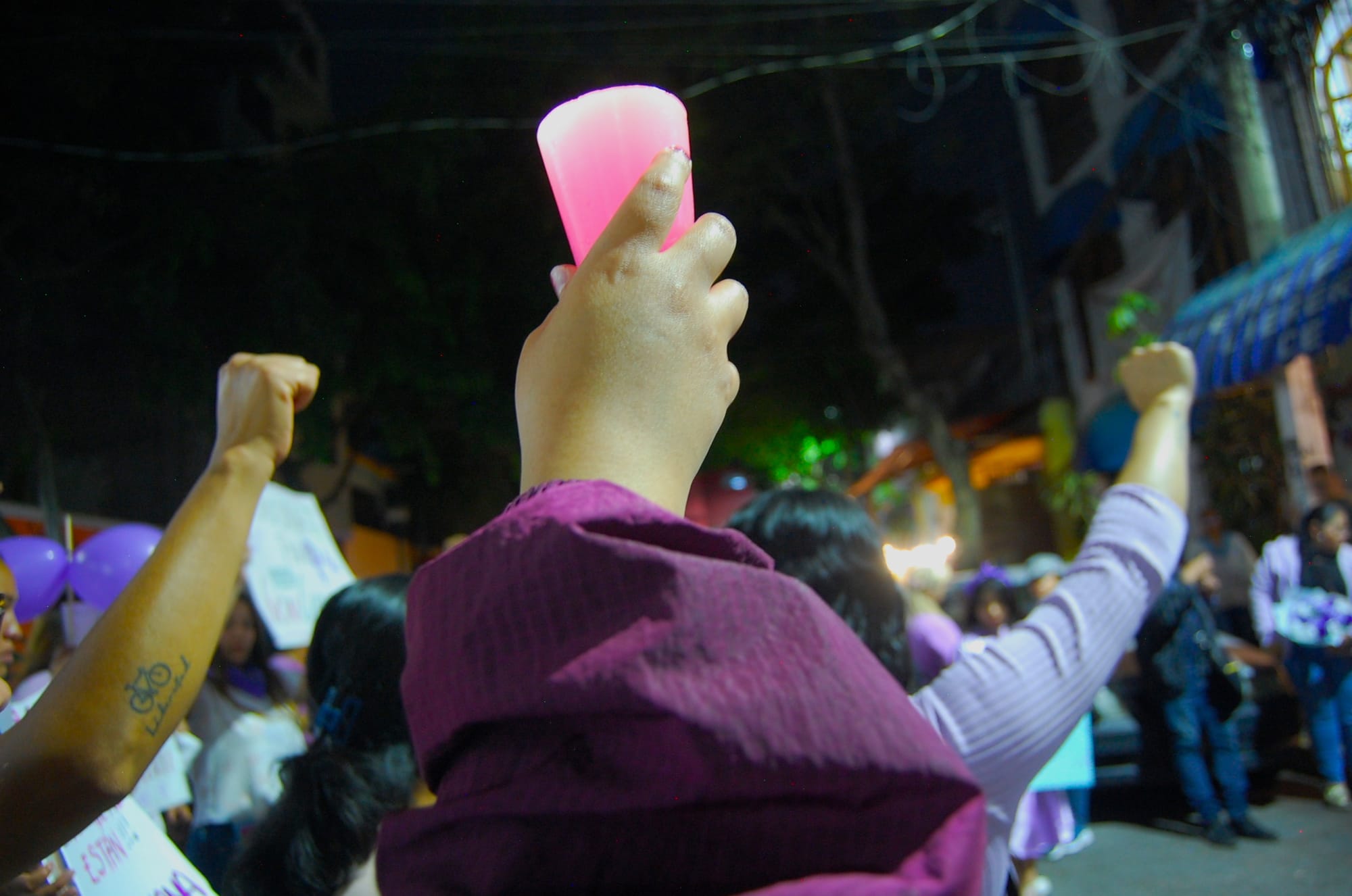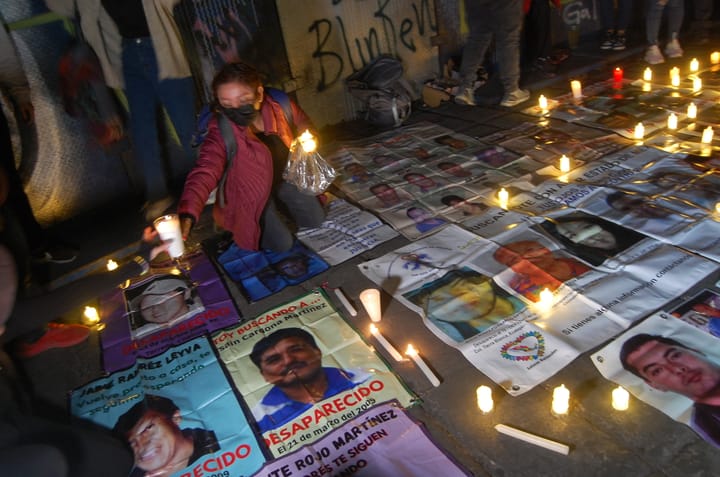International Women's Day from the Mexico City fringes
Far from the massive march in the center of the capital, neighbors in the working-class neighborhood of Santo Domingo denounced the violence they experience at home.
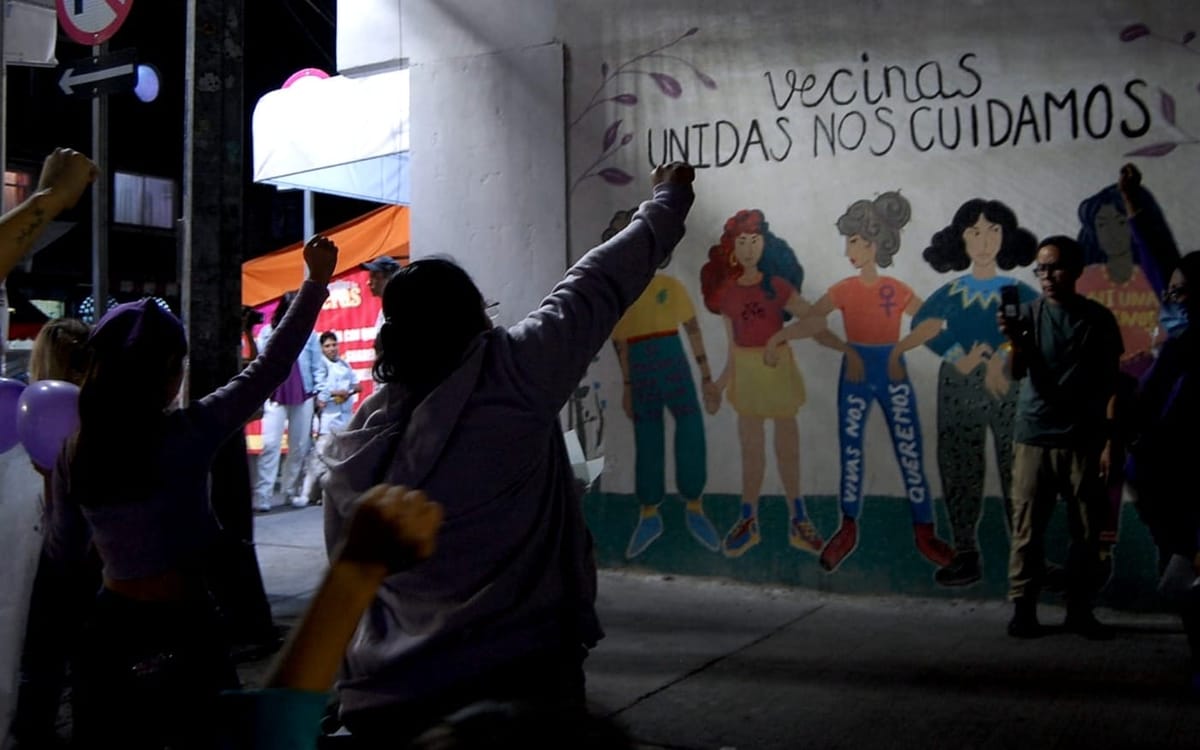
PEDREGAL DE SANTO DOMINGO, MEXICO CITY.— As the evening of March 8 fell over the Universidad metro station in southern Mexico City, Paola Flores Villegas hovered over a table at the entrance to the Copy Plus stationery shop. Some 30 women and children dressed in purple passed markers from hand to hand and wrote slogans on pieces of poster-board. A child painted her hands lavender and left a line of prints around a sheet of paper. The International Women’s Day march through the center of the capital had ended, but here, on the periphery, the demonstration was just beginning. This was the second annual Women’s Day march in the Pedregal de Santo Domingo.
The idea for the march came from the Amazonas Collective, a group of women entrepreneurs in the neighborhood. “We realized that a lot of us wanted to go to a march, and we needed to speak out about what’s happening in the neighborhood,” says Paola, a member of the collective and one of the organizers of the march. “There’s a lot of harassment. Women are afraid to go out at night. There are killings, but we're fighting back.”
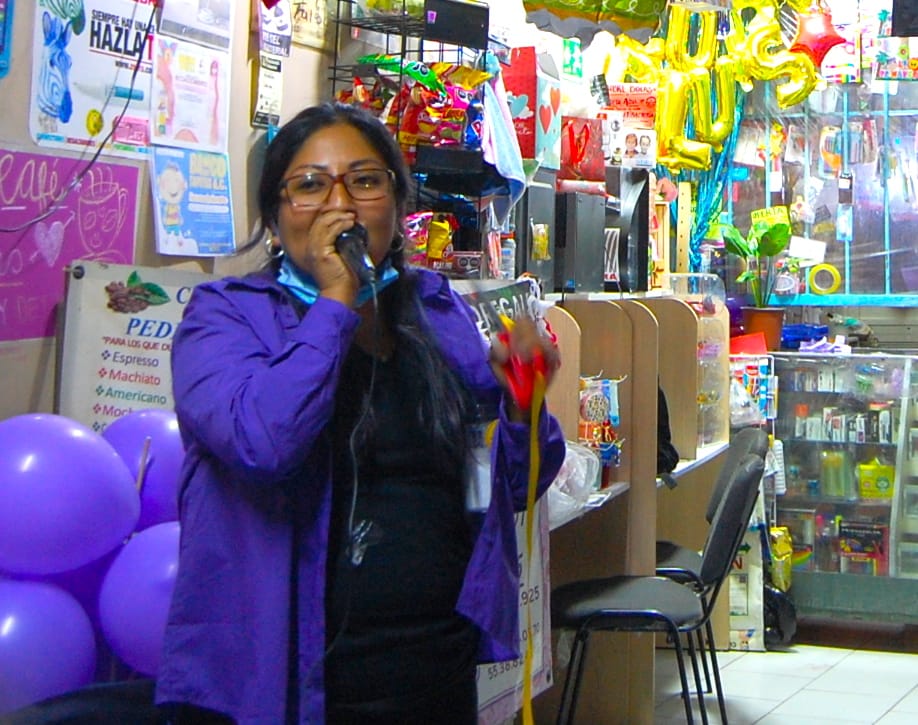
32-year-old Paola was born and raised in the Pedregal. The local women, she says, are “warriors,” thanks to the area’s history of social organization: the neighborhood was created through a land invasion in the 1970s. Her mother, María de la Luz Villegas Días, arrived five years after the original settlement. From the stationery store that she has owned for the last 40 years, María de La Luz recalled that, back then, they had neither paved streets nor running water. The Pedregal’s first neighbors carried water in buckets to their homes over the volcanic rock that covered the terrain.
“It was a chore for everyone, but mostly for the women, because we were at home. We had to wash clothes, wash dishes, make food,” María said. Since then, the women from the Pedregal have been characterized by their strength. She recalls that it took 15 or 20 years for water and electricity to reach their homes.
“Now it’s an expensive area to rent, because we have all the comforts nearby. We have the metro, and we have a major road and shopping malls nearby,” she added.
But with the arrival of those services, the area lost the communitarian spirit that once characterized it. It used to be an easier place to live. “There wasn’t this distrust, the violence that has spread everywhere. We could go out at night and walk home. Nothing happened to you.”
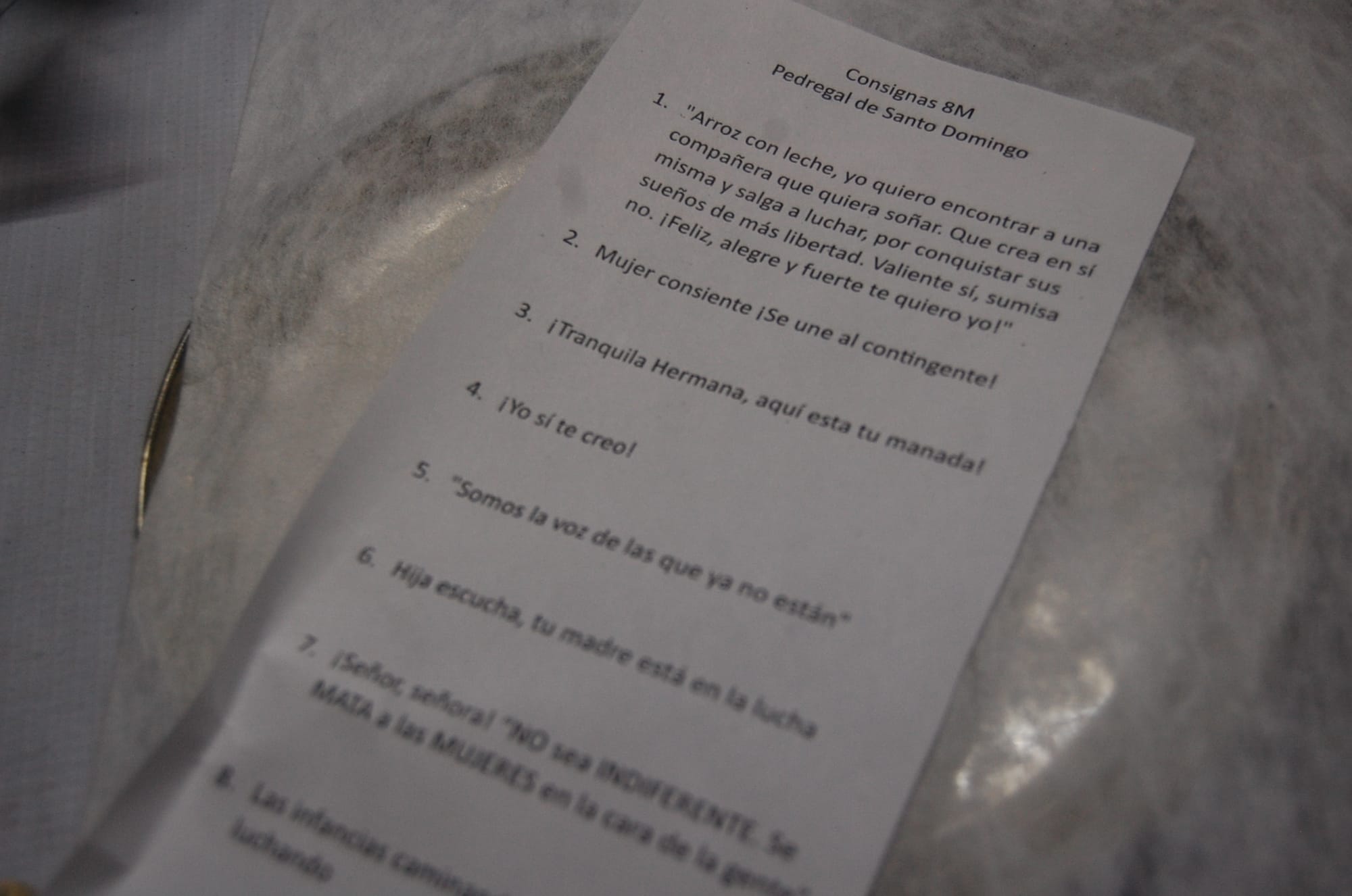
At seven P.M., the small brigade left the stationary store with their hand-drawn signs held high. The sisters Hilda and Paola Heredia, 26 and 21 years old, walked shoulder to shoulder, candles in there hands. They were born in the neighborhood, and this was their first feminist demonstration. Hilda said she marched for her eight-year-old daughter: “so she can go out freely, without fearing anything, and so I can let her go wherever she wants without being afraid that she won’t come home.”
In recent years, feminist protests in the center of the city have been characterized by rejecting the presence of men, here several men participated, keeping watch over the perimeter of the march as the women chanted. They evaded taxis and rush-hour buses as they marched down Anahuasco Street, one of the neighborhood’s main thoroughfares, crowded with stands seeing food, flowers and clothing. Some neighbors watched the parade with interest; others looked away.
The group turned down Canahutli Street, where they stood for a moment of silence before a mural titled “Women in the neighborhood take care of each other.” Among the texts on the signs were the names of Diana Laura Ricardez, a resident of the Pedregal killed by her ex-partner on February 20, 2024, and Ivon Cervantes Espinosa, who went missing on January 7, 2024. Her body was found a week later in the Chalco lake; her ex-partner is thought to have killed her.
The protestors’ candles illuminated the narrow, dark streets until they arrived at the Escuelita Emiliano Zapata, a local community space, where Yolanda Becerro, from the Escuelita, and Rosa Elena Bernal Díaz, from the neighboring coffee shop and bookstore Quijote, received the march. Several women gave speeches, some with their voices shattered by emotion. They spoke about the importance of community and parenting to prevent violence against women.
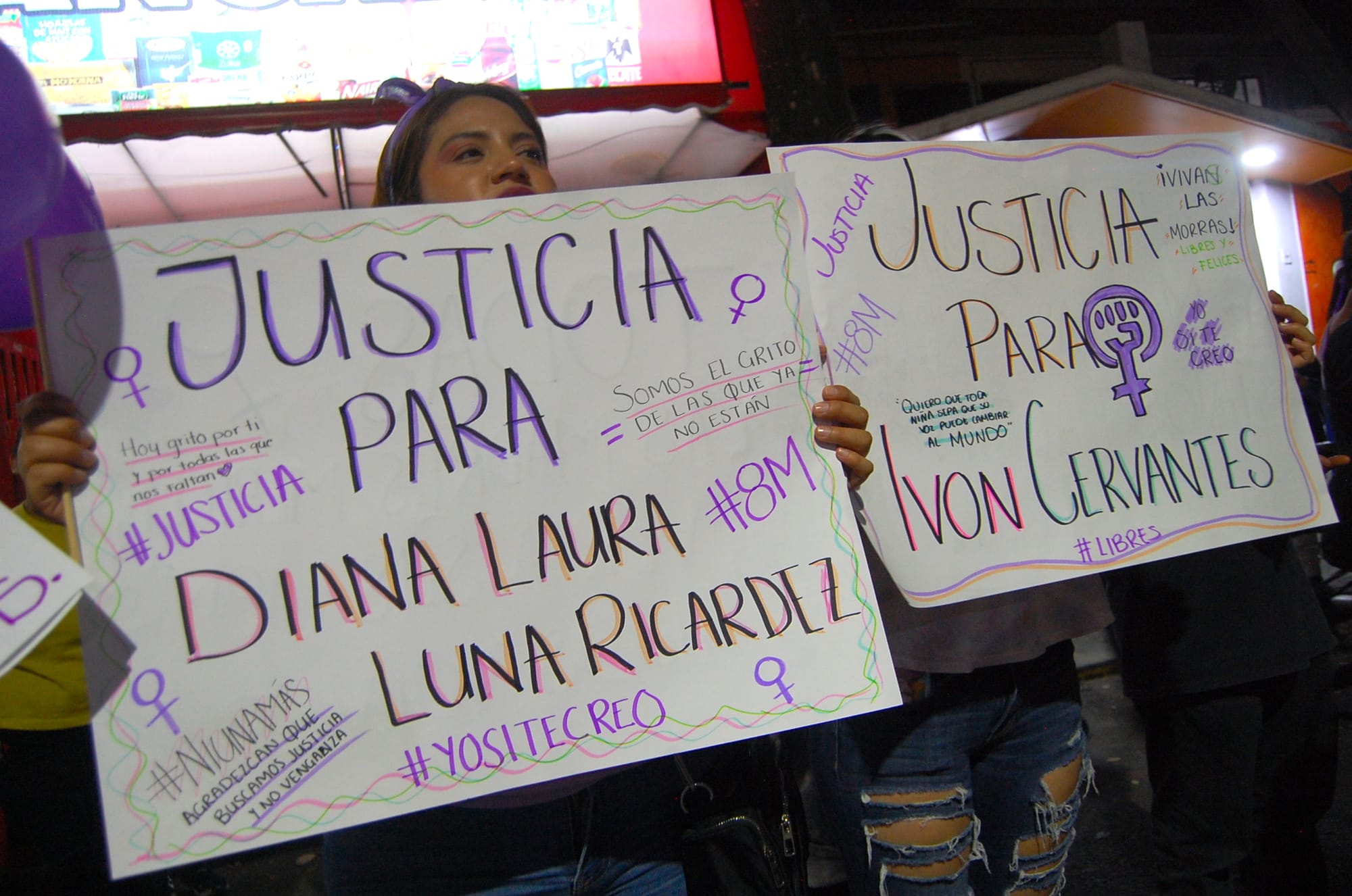
“Men aren’t born violent. We have the opportunity to remake them,” said Yolanda. “What can we do in our families so that each man can change that mentality, so they can see us as equals?”
“If we’re daughters of the rock fields that gave life to this neighborhood, in this neighborhood, we will give our children a better life,” said Elena López, also born and raised in the neighborhood and a member of Yaocihuatl, a group of local women who come together to embroider. “We will defend Santocho from megaprojects, violence and discrimination.”
To end the evening, Rosa Elena guided the protestors in a brief movement session. Standing in the middle of the dark street, the women and girls shook out their bodies and loosened their hips. They cleansed themselves of the pain and anger that they carry through the streets day after day. Rosa Elena shouted and they repeated after her: “Enough!” They yelled in unison. “I told you no!” “Don’t you understand?”
Their voices cut through the night. Following Rosa’s instructions, they pawed at the air, digging a pit to toss away everything they didn’t want.
“Now lift it up,” Rosa urged them. “Ask Mother Earth to transform it. To take it to the heavens.”
